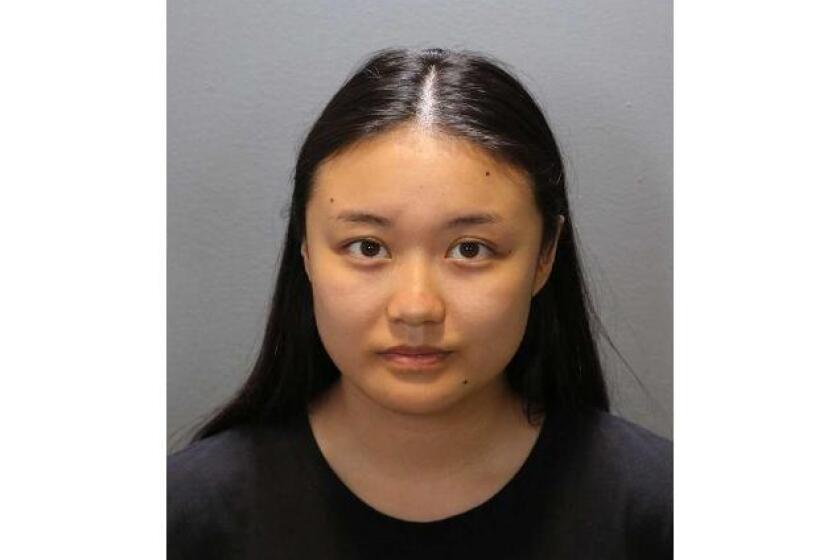Suspended Officer Had a History of Accusations
The LAPD officer suspended after being caught during an undercover sting last week had been accused several times over his 16-year career of planting evidence on suspects, with the city paying out $520,000 to settle two civil lawsuits filed against him.
The district attorney’s office is deciding whether to file charges against Edward B. Zamora, who was the subject of an L.A. police investigation in which he was given the opportunity to arrest an undercover officer. Zamora allegedly claimed in his police report that the “suspect” dropped drugs during the arrest, when detectives secretly watching knew that Zamora had actually found the drugs on the ground, where they had been placed by the department.
The LAPD said it targeted Zamora, 44, for an ethics investigation based upon complaints about him and after noticing an unusual pattern of arrests.
The Times found that the city has been aware of accusations that he and officers working with him planted evidence.
In December, the City Council approved a $300,000 settlement of a lawsuit by a 42-year-old man whom Zamora and a partner arrested for possessing a rifle.
A criminal jury acquitted Jorge Hernandez in less than 20 minutes of being a felon in possession of a firearm, but not before he spent more than a year in jail, where he was beaten by fellow inmates.
Hernandez sued the LAPD in federal court, and in November a jury unanimously decided that Zamora and Officer Heriberto Arangure had falsely arrested him and prepared a false police report, court records show. The city settled the case before the jury agreed on a sum for damages.
A year before, the City Council approved a $220,000 settlement with Mauro Garcia, a South Los Angeles man who alleged that Zamora and other officers had planted a rifle and bag of drugs on him after they searched his home in November 1998 without a warrant.
During a deposition in that case, Zamora revealed that he was once briefly a partner of Rafael Perez, the officer at the center of the huge corruption scandal in the LAPD’s Rampart Division in the late 1990s. Perez told investigators that he and other officers had routinely falsified evidence, framed suspects and covered up unjustified shootings. Zamora was not linked to that scandal.
LAPD Chief William J. Bratton has highlighted the Zamora case as evidence that the LAPD is taking seriously accusations of misconduct against officers. Officials said the investigation began six months ago.
“We review all the lawsuits and allegations concerning any misconduct by officers. We read every single personnel complaint,” said Deputy Chief Michael Berkow. “No one factor led to this investigation, but the totality of the circumstances led to the launch of an integrity audit.”
The sting was carried out by the Ethics Enforcement Section, a team created in 2001 as part of the reforms to help ferret out corruption in the wake of the Rampart scandal.
Zamora could not be reached for comment Thursday.
In addition to the two cases that the city settled, Zamora was a defendant in at least two other lawsuits in which defendants claimed that drugs were planted on them. At least one case was dismissed.
Robert Berke, who represented Hernandez, said his client originally pleaded no contest to the gun possession charge. But Berke said he urged Hernandez to change his plea after looking into the case further.
At trial, his attorneys showed that Hernandez’s fingerprints were never on the weapon and claimed the officers framed him because he looked homeless.
The city initially offered $1,500 to settle Hernandez’s civil suit over the rifle arrest, Berke said, but Hernandez refused.
“The jury in the federal court basically listened to Hernandez, a semi-homeless man, and believed him over the officers,” Berke said. “That doesn’t happen very often.”
According to court records, defense attorneys presented evidence in the case showing that Zamora had been suspended for five days by the LAPD.
In January 2003, the department internally charged him with dishonesty, making false statements and falsifying his daily activity field report. Few details of the accusations are available. But an LAPD Board of Rights found him guilty of having a report log that did not match information on radio frequencies and a computer system, according to the court records.
The second settlement stems from the arrest of Garcia, 38, on Nov. 17, 1998, on suspicion of possessing a short-barrel shotgun and cocaine. Zamora was one of several officers on that case.
The officers said they went to Garcia’s home after an informant told them he had just seen a man holding a shotgun there.
When they arrived, officers said, they saw Garcia duck down behind a car, and they then found the shotgun near him and a bag of cocaine in his pocket. Officers said Garcia gave them permission to search his home, where they said they found another weapon.
Garcia was found guilty. But a court of appeal in 2001 overturned his conviction. It said Garcia should have been able to present more evidence in his own defense, including a radio dispatch call from the officers that mentions a narcotics investigation but nothing about a man with a gun.
The court also said Garcia should have been able to show evidence that the officers ransacked his house.
Prosecutors did not refile the case after the appeals court’s decision.
More to Read
Start your day right
Sign up for Essential California for news, features and recommendations from the L.A. Times and beyond in your inbox six days a week.
You may occasionally receive promotional content from the Los Angeles Times.







